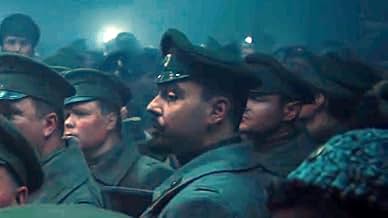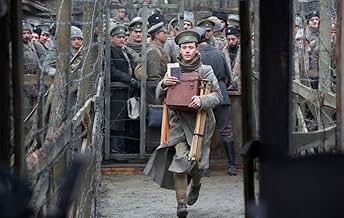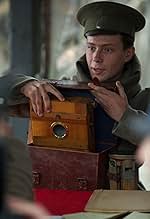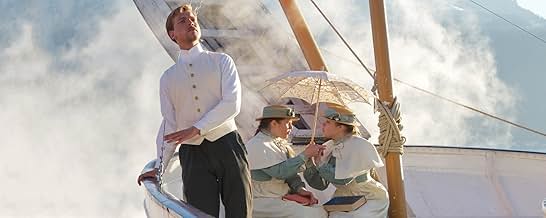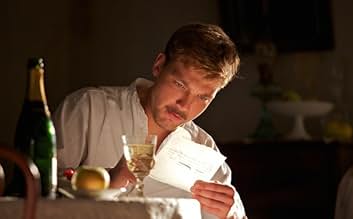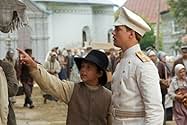Solnechnyy udar
- 2014
- 2h 55m
IMDb RATING
5.8/10
1.2K
YOUR RATING
Officers of the White Army, holding as POWs in a Red Army's camp, try to understand why they lose Civil War and lost the Russian Empire at all.Officers of the White Army, holding as POWs in a Red Army's camp, try to understand why they lose Civil War and lost the Russian Empire at all.Officers of the White Army, holding as POWs in a Red Army's camp, try to understand why they lose Civil War and lost the Russian Empire at all.
- Awards
- 6 wins & 3 nominations total
Martins Kalita
- Poruchik
- (as Martinsh Kalita)
Featured reviews
Excellent movie, excellent direction and acting, fantastic scenaries and photograph. Unfairly Underrated in IMDM probably by American pie watchers
I won't give away the "key" -- that's for the viewer to discover -- but until I figured it out for myself, about 2/3 of the way through, I was so exasperated by this movie that I was tempted to just give up on it and quit. I thought it was incoherent and disjointed, and actually got peeved since I thought it was screwing with me.
But THEN... I figured out who/what the young officer in white, and the various appearances of the attractive woman, represented... and my whole experience changed. By the end of the movie, I was devastated. The lingering final image and text -- and the song sung over it -- left me trembling and weeping. The whole thing haunted me for days, then weeks, afterward.
I intend to watch it again from the beginning, now that I know what it's about. But I am waiting a bit, since I still haven't recovered from that first experience.
This is a very different kind of movie. It's NOT a straight story/narrative, and expecting such will just leave you frustrated. Mikhalkov is a sort of poet, who has used seemingly unconnected images to evoke feelings and impressions. He uses visual/emotional images to conceal deep realities of history. And, for this viewer at least, realities of humanity in general. For though the movie is concerned with 20th-century Russia/USSR, it speaks to me, as an American in 2022, of a more general truth, one we should all take to heart as our own glittering Western consumer culture heads for collapse: Concealed beneath superficially beautiful things (and hoo-boy, are the "in-color" parts of this movie a sensual feast for the eyes!) can lie the ugliest horrors of which humans are capable.
But THEN... I figured out who/what the young officer in white, and the various appearances of the attractive woman, represented... and my whole experience changed. By the end of the movie, I was devastated. The lingering final image and text -- and the song sung over it -- left me trembling and weeping. The whole thing haunted me for days, then weeks, afterward.
I intend to watch it again from the beginning, now that I know what it's about. But I am waiting a bit, since I still haven't recovered from that first experience.
This is a very different kind of movie. It's NOT a straight story/narrative, and expecting such will just leave you frustrated. Mikhalkov is a sort of poet, who has used seemingly unconnected images to evoke feelings and impressions. He uses visual/emotional images to conceal deep realities of history. And, for this viewer at least, realities of humanity in general. For though the movie is concerned with 20th-century Russia/USSR, it speaks to me, as an American in 2022, of a more general truth, one we should all take to heart as our own glittering Western consumer culture heads for collapse: Concealed beneath superficially beautiful things (and hoo-boy, are the "in-color" parts of this movie a sensual feast for the eyes!) can lie the ugliest horrors of which humans are capable.
10cdrpsu
...for this beautiful and well-woven film. Stunning cinematography, beautifully subtle acting, and a great telling of a side of the Russian revolution unknown to most western audiences. One of those movies where you remember almost every scene.
By the way, the illicit love affair is the most well-done scene of it's type I've ever seen. Not only you you feel the different passions, you understand them.
And the second viewing is even more enjoyable than the first.
I purchased and will watch many times.
By the way, the illicit love affair is the most well-done scene of it's type I've ever seen. Not only you you feel the different passions, you understand them.
And the second viewing is even more enjoyable than the first.
I purchased and will watch many times.
10papaioan
Sublime fusion of two of Bunin's works, with beautifully achieved juxtaposed cinematography. The viewer is put in the shoes of the protagonist's plight while bitterly recollecting the most hopeful moment in his past.
This movie is actually two different stories. One is Bunin's short story Sunstroke which is shown in a beautiful and poetic way in the movie. It represents the past, old Russia, the time Bunin never dropped in his mind. The other is taken from his famous anti Bolshevism book Cursed Days. This part is shown in the movie, in a wet and muddy way, about a group of old officers waiting for their destiny after signed their declarations of surrender.
It is understandable that the director tried to divide these two stories. Old is good, elegant, beautiful, lovely, honestly. New is chaotic, dirty, brutal, empty. Although one may not fully agree with it, but this is what Ivan Bunin's understanding of Bolshevism Revolution and the opinion is widely accepted after the collapse of Soviet Russia. Nikita Mikhalkov's most famous movies are almost about the same attitude.
But the director also used his movie to pay tribute to old Soviet movie traditions. There's an astonishing shot of a baby carriage rolling downsteps, which is obviously something reminding Eisenstein. There's also certain images reminding Bondalchuk.
So far there's no problem with the two stories go in parallel. But at the very end the stories tried to reach a point of combination. This became so hard to believe that the climax felt a little bit strange.
Still it's a great movie. Despite its length, the storytelling speed is extremely well that one hardly felt the time's gone. It might also be one element the director had in mind. Time went without raising attention, old time went like river never comes back.
It is understandable that the director tried to divide these two stories. Old is good, elegant, beautiful, lovely, honestly. New is chaotic, dirty, brutal, empty. Although one may not fully agree with it, but this is what Ivan Bunin's understanding of Bolshevism Revolution and the opinion is widely accepted after the collapse of Soviet Russia. Nikita Mikhalkov's most famous movies are almost about the same attitude.
But the director also used his movie to pay tribute to old Soviet movie traditions. There's an astonishing shot of a baby carriage rolling downsteps, which is obviously something reminding Eisenstein. There's also certain images reminding Bondalchuk.
So far there's no problem with the two stories go in parallel. But at the very end the stories tried to reach a point of combination. This became so hard to believe that the climax felt a little bit strange.
Still it's a great movie. Despite its length, the storytelling speed is extremely well that one hardly felt the time's gone. It might also be one element the director had in mind. Time went without raising attention, old time went like river never comes back.
Did you know
- TriviaThe film was selected as the Russian entry for the Best Foreign Language Film at the 88th Academy Awards but it was not nominated.
- ConnectionsFeatured in Vecherniy Urgant: Nikita Mikhalkov/Viktoriya Solovyova (2014)
- SoundtracksNe dlya menya
Music by Nikolay Devitte
Lyrics by A. Molchanov
Performed by Nikita Mikhalkov and State Academic Kuban Cossack Choir
- How long is Sunstroke?Powered by Alexa
Details
Box office
- Gross worldwide
- $1,679,843
- Runtime
- 2h 55m(175 min)
- Color
- Sound mix
- Aspect ratio
- 2.35 : 1
Contribute to this page
Suggest an edit or add missing content


